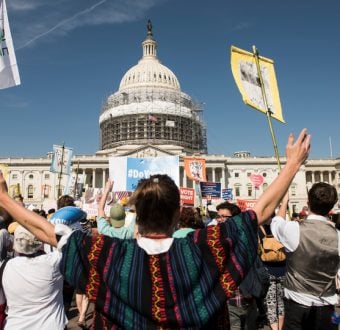WASHINGTON (July 10, 2018) – Yesterday, President Trump nominated Judge Brett M. Kavanaugh of the U.S. Court of Appeals for the D.C. Circuit to succeed Associate Supreme Court Justice Anthony Kennedy.
Annie Leonard, Executive Director of Greenpeace USA, made the following statement:
“The Senate must not confirm Brett Kavanaugh for the US Supreme Court. Trump’s nomination sits under a cloud of conflicting interests. The President remains under criminal investigation and Kavanaugh has made clear he believes the Government may not indict sitting presidents. While appointing Kavanaugh may help Trump’s legal battle, it will not help America.
“Kavanaugh’s long record shows a consistent pattern of supporting the ability of powerful corporations to do as they please, while undermining democratic efforts to protect the common good.
“Additionally, his history on climate and environment issues should be of grave concern.
“If approved, Brett Kavanaugh could inflict irreparable damage on U.S. efforts to fight global climate disruption. His record on climate and the environment includes attempts to limit the power of the Environmental Protection Agency and casting doubt on the EPA’s ability to use the Clean Air Act to regulate climate pollution. It’s the job of federal agencies to implement laws designed to protect the people and the environment, Kavanaugh appears ideologically opposed to that idea.
“Kavanagh’s appointment would have grave consequences for our country and our climate for many years to come. The American public deserves a justice who will respect our democracy and protect the health of our families and our climate.”
Contact: Kate Fried, (202) 257-0057, [email protected]

